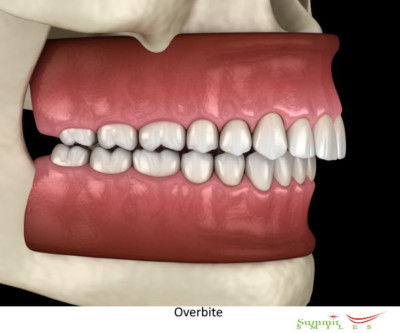Many individuals opt to live with having an overbite and not fix it. The late rock star Freddie Mercury, for example, elected to preserve and appreciate his significant overbite. For others, addressing this problem is just to enhance occlusion (dentistry) that will boost their visual look. But others may need to treat it to prevent consequences such as jaw disorders and damage to the teeth and gums.
What is an Overbite? | What Causes an Overbite? | Types of Overbite | What issues does Buck teeth cause? | Fixing Buck Teeth
What is an Overbite?
 An overbite or buck teeth develops when the top teeth jut out too far beyond the lower teeth. Most individuals have at least a little overbite, and it isn’t very obvious, nor does it damage their biting or dental health.
An overbite or buck teeth develops when the top teeth jut out too far beyond the lower teeth. Most individuals have at least a little overbite, and it isn’t very obvious, nor does it damage their biting or dental health.
When the problem is very serious, it may cause irreversible damage to the teeth and temporomandibular joint dysfunction. Severe buck teeth may also radically change the face shape that can lead to psychological disorders and poor self-esteem. Our dentist at Summit Smiles help straighten your teeth and get rid of overbite for good.
What Causes Buck Teeth?
The cause is typically hereditary and may often be transmitted through generations, however there are environmental stimuli that might push the teeth to migrate. The cause is typically hereditary and may often be transmitted through generations, however there are environmental stimuli that might push the teeth to shift.
Thumb Sucking
It is natural for a child to suck their thumb, but if it persists into three or four years of age and when their permanent teeth are growing, the pressure created by sucking the finger might cause the permanent teeth to come in at an incorrect angle.
Pacifier
Sucking a pacifier may cause it the same way that thumb sucking does. According to the 2016 Journal of the American Dental Association, pacifier usage increases the risk of malocclusion.
Tongue-thrusting
When the tongue moves far forward in the mouth, the teeth are frequently forced to migrate forward as well. This often develops in an open bite malocclusion, although it may also result in buck teeth.
Teeth Grinding
Many individuals grind their teeth without even realizing it. It is fairly normal for teeth to grind during sleeping. Overbite is often caused by bruxism, which may lead to significant discomfort in the jaw and head region. Teeth grinding may also cause early wear of the tooth enamel, which can lead to tooth decay. Learn about tooth colored.
Missing or Impacted Teeth
The alignment of the front teeth may be affected by tooth spacing or crowding. When one or more teeth are missing, the remaining teeth move over time, changing the position of your teeth.
Bite Alignment problems may also be caused by a lack of room to fit the teeth. Diastema refers to gap in teeth. These spaces can form anywhere in the mouth, but are sometimes noticeable between the two upper front teeth.
Genetics
A lot of people are born with a small upper or lower jaw because their jaws are not straight. Because an overbite is passed down, if your parents or siblings have one, you may have one as well, even if you don’t.
Tumors and cysts of the mouth or jaw
Tumors and cysts in the mouth or jaw can change how your teeth are aligned and how your mouth and jaw look. This happens when there is a lot of swelling or growth in the soft tissues or bones in the upper part of the mouth. This can make the jaw move forward, which can hurt.
In addition, people who nail biting or chewing on hard things like a pen, pencil, or something else can have an overbite.
Types of Overbites
Vertical – When the top teeth are very close to the bottom teeth.
Horizontal – These things happen when the top teeth are bigger than the bottom teeth
This means that it’s possible for a patient to show signs of both vertical and horizontal overbite at the same time. Another way to think of it is dental or skeletal. Because buck teeth are caused by teeth, it’s a dental thing to do. This is when the jaw is the cause of the problem. More about Porcelain.
What issues does Overbites can cause?
A lot of problems can happen if you don’t get this condition taken care of. If you don’t get it taken care of, you could lose a lot of your teeth and have a lot of other problems. In order to keep your mouth healthy, you need to take good care of it and go to the dentist often.
Fixing Buck Teeth/Treatment for Overbite
Most of the time, you’ll have to have orthodontic treatment because medicine alone won’t be able to help. In children, it is easier to treat because a child’s jaw is still in the early stages of development. Adults, on the other hand, will have a hard time because you haven’t had any treatment up until now. It will be more serious. More about hidden bracket braces.
In either case, the doctor will look at the area and give advice on how to treat it. These treatments can last for two years or even longer, but it’s not certain.
In dentistry, your orthodontist (one of the many medical specialties) might recommend these:
Children:
- Getting rid of the baby teeth so that there is more room for the permanent ones to grow
- Retainer (orthodontics)
- A tool to help the jaw grow in the right place.
- Braces with archwires
Adults:
- Braces – the best method to correct this condition.
- Tooth extraction – It might be hard for your orthodontist to do this, so he or she might not do it at all.
- Surgery – for skeletal-type problems, surgery is recommended.
Summit Smiles can help treat your overbite and get you the smile you always wanted.
Don’t live with an overbite when there are other ways to fix it. Schedule an appointment today to find out what it will take to get you smiling your best and having great oral health.
